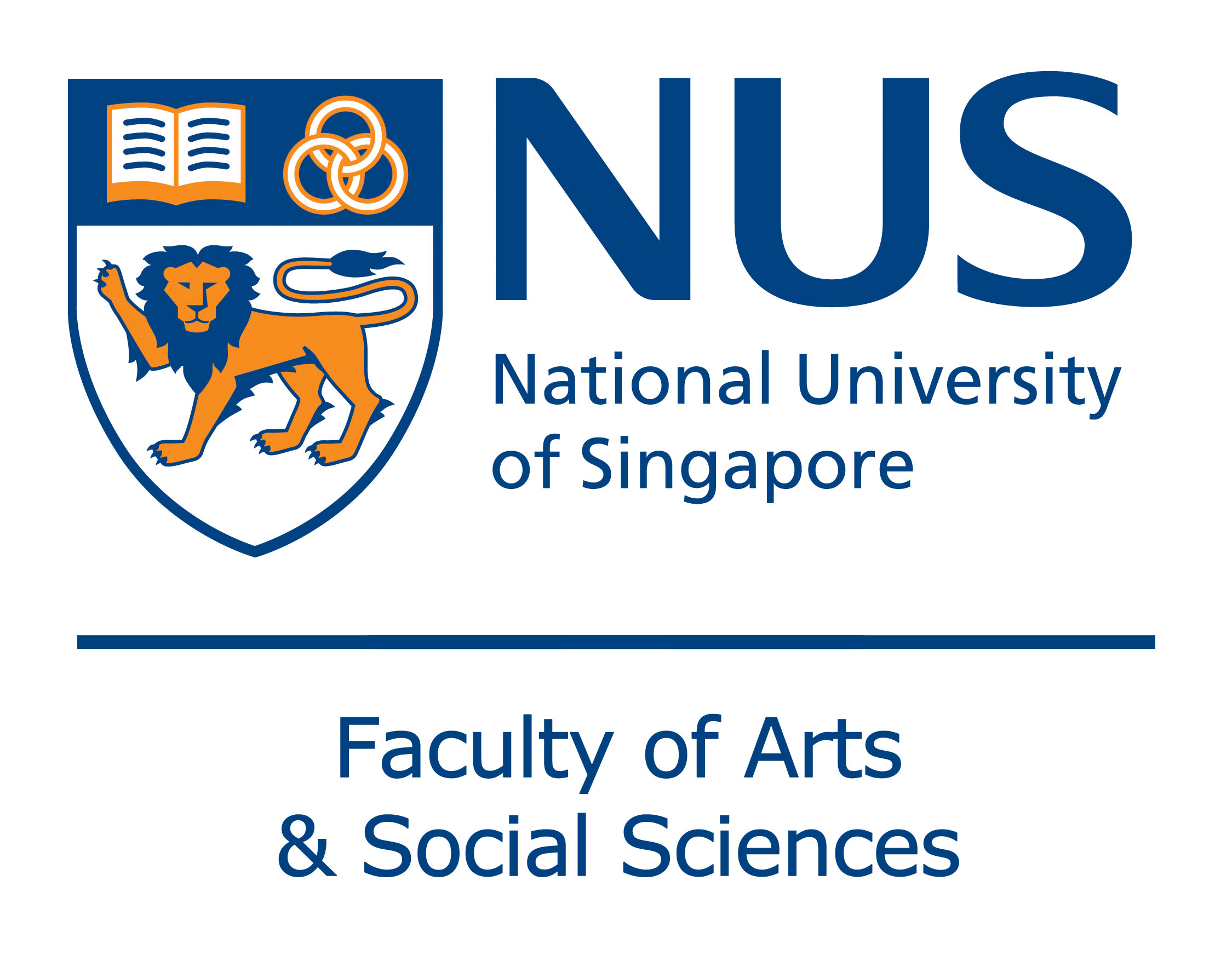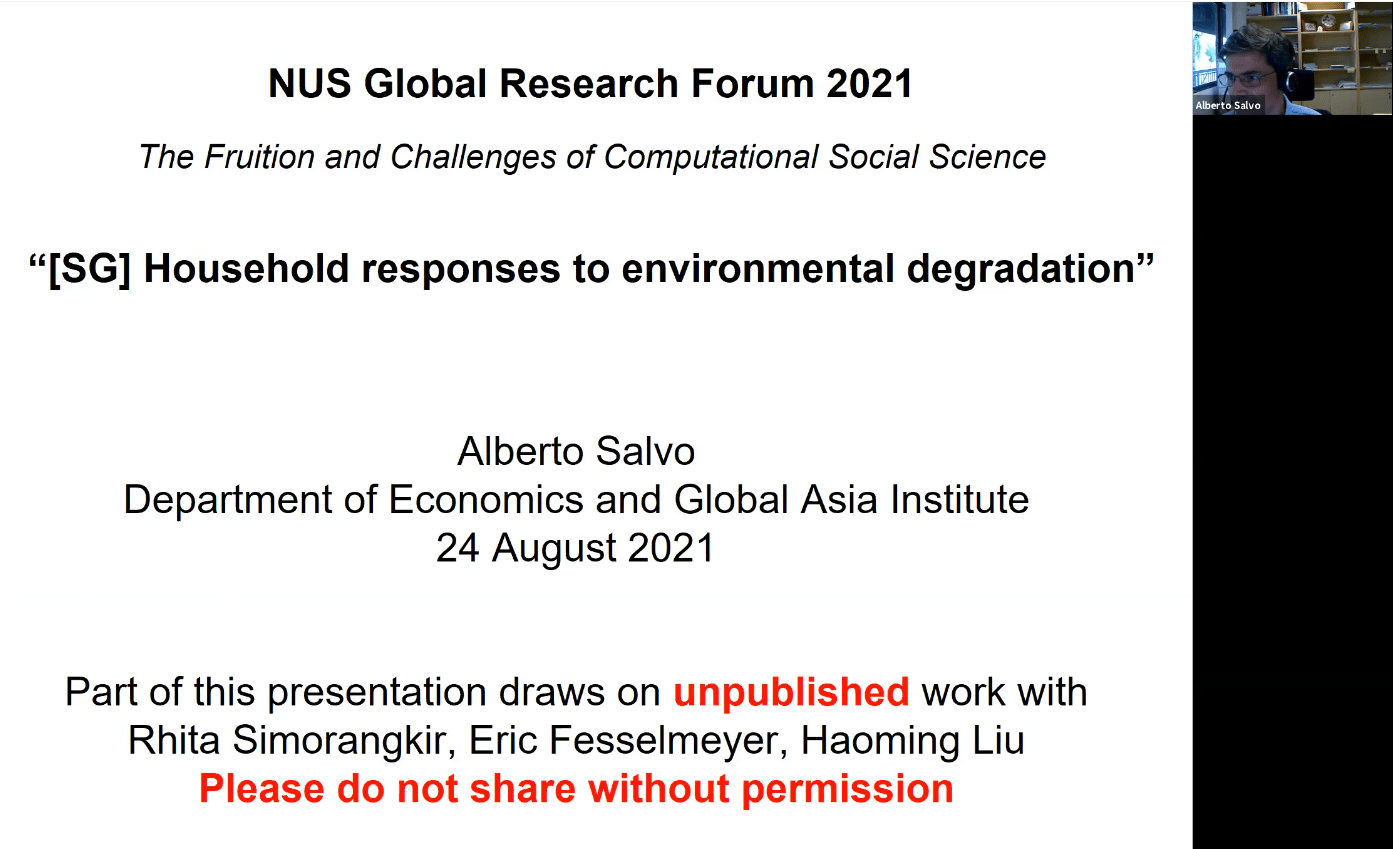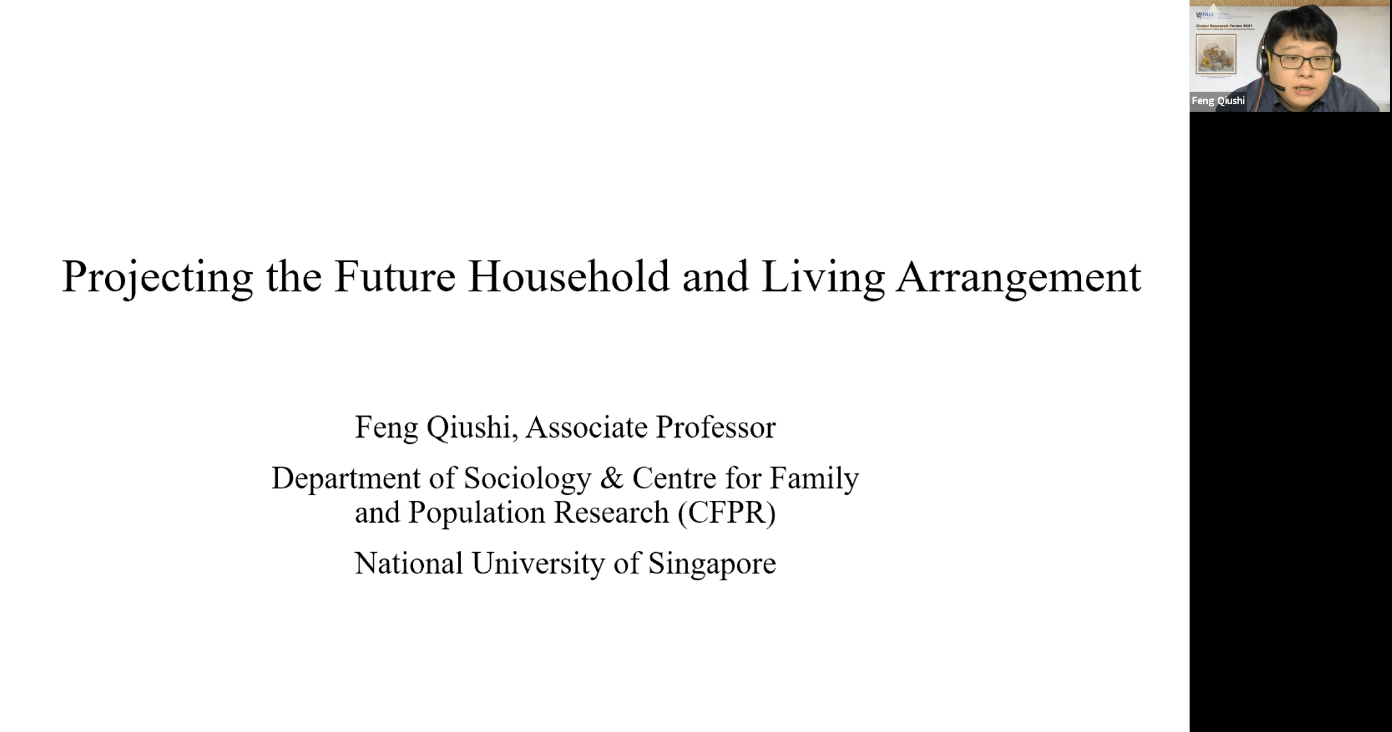‘Development and Sustainability’, the third theme of the FASS Global Research Forum, featured talks by Professor Lorenz Goette (NUS Department of Economics), Associate Professor Alberto Salvo (NUS Department of Economics), and Associate Professor Feng Qiushi (NUS Department of Sociology and Centre for Family and Population Research).
Prof Goette presented ‘The Role of Attention in Resource Conservation: Evidence from Field Experiments’, which proposes real-time feedback on natural resource use in order to better encourage more economical, efficient, and effective conservation behavior. He used the approach of behavior-specific real-time feedback in research on showering, where shower users were provided with information on their resource use while they were using resources. The project involved collaborations between social scientists and information systems scientists and employed computational social science to promote sustainability in policymaking.
Prof Goette pointed out that showers typically last five minutes while consuming 7% of our daily energy use and 30% of our daily water use. A smart shower meter powered by shower water flow was developed to deliver and save data on water volume, temperature, duration, and breaks of each shower. He talked about how the meter was tested in an experiment his research team carried out in Zurich for two months with 629 households assigned to either a control group that only saw the water temperature, or a feedback group that saw only the water temperature for their first ten showers, and then received the full amount of information from the meter for their remaining showers. The feedback group ended up saving almost 0.6kWh energy and 9 liters of water per shower, during approximately 45,000 showers.
Prof Goette led a second study that explored whether the feedback on resource use was more effective when delivered live. A third group that received deferred feedback was incorporated into the second experiment, and this group ended up reducing their showering time by a smaller amount than the live feedback group. Prof Goette then explained how the research was expanded to better influence people to conserve more water and energy through goal-setting. The Water Supply Networks Department at the Public Utilities Board of Singapore (PUB) financed Prof Goette’s next project, which covered 550 households. An additional group that received real-time feedback with an indication once the shower user was no longer meeting the goal of using no more than a set amount of water and energy was incorporated into the smart shower meter experiment. This group was most successful in reducing their resource use, and when goals that were too arduous or too easy were set, they were found to be less effective in resource use reduction. PUB subsequently launched the Smart Shower Programme (2019-2020), a policy pilot project that equipped more than 10,000 built-to-order (BTO) flats with smart shower meters.
Prof Goette discussed additional research he conducted on spillover effects from behavioral changes that led to reduced resource use. He explained that spillover effects can be beneficial or harmful, and that measuring them is important in promoting better policymaking. His team evaluated the Smart Shower Programme to determine whether the reduction in water use when showering caused residents to increase their non-shower water use. He found that a third of the water households saved when showering was ‘spent’ on additional non-shower water use. This underscores the need to be aware of the degree of potential negative spillover effects when undertaking targeted behavioral interventions to conserve natural resources, as seen in the smart shower meter experiments.
Assoc Prof Salvo presented on ‘Household Responses to Environmental Degradation’, which similarly showcases policy-relevant computational social science where society and the environment interact. He has been studying how households in Singapore respond to environmental degradation – specifically heat and air pollution. Assoc Prof Salvo shared his study on how households use electricity, water, and natural gas. He explained how he examined 10% of Singapore households’ use of these resources from September 2012 to December 2015 and emphasized that wealth inequality has a pronounced influence on resource use. Assoc Prof Salvo discussed related studies on how air pollution determines electricity demand in Singapore and how they demonstrate defensive energy expenditure and its connection to inequality.
Assoc Prof Salvo additionally spoke about his research on how offices, malls, and parks provide heat relief in Singapore. His research team examined phone and commuting location data during June to August 2016 and 2017 to see how Singaporeans respond to variations in heat, and identified the ‘cooling co-benefits’ of different commercial and leisure sites. He emphasized that environmental degradation continues to induce, through our response, additional environmental damage, in a vicious cycle. Assoc Prof Salvo also explained that Singapore has adapted to the current changes in climate in a more beneficial way than other wealthy countries. However, from an environmental justice perspective, the inequality in Singaporeans’ defensive expenditure to cope with heat and air pollution is important to address. Ultimately, Singapore must quickly and strongly prepare for more dramatic climate effects and continuously evaluate and improve how it adapts to global heating and its environmental hazards and emergencies.
Assoc Prof Feng presented on ‘Projecting the Future Household and Living Arrangement’, where he spoke about how household size is rapidly shrinking around the world and the implications for eldercare. He stressed that we also need to take into account the fact that the household growth rate has been substantially higher than the population growth rate. This causes resource, commodities, and services usage to become less sustainable since more households made up of fewer people use more resources than fewer households made up of more people. Assoc Prof Feng emphasized the importance of projecting consumption of resources, commodities, and services by households and not just by population, which could be misleading.
Assoc Prof Feng discussed the ProFamy Method, a macrosimulation method of household projection, which simulates household and living arrangement changes based on individuals grouped by age, sex, race, marital/union status, co-residence of children and parents, and migration. He noted that ProFamy is also a cohort-component method, in which the projection of the demographic components mentioned previously is conducted for each of the cohorts that produce future household distributions. Assoc Prof Feng pointed out the method’s success in a variety of research projects and promoted ProFamy’s usefulness in addressing the problem of limited sub-national data on household projections.
Watch the video from Theme 3: ‘Development and Sustainability’ here.
Stay tuned for more from the Global Research Forum!





You must be logged in to post a comment.